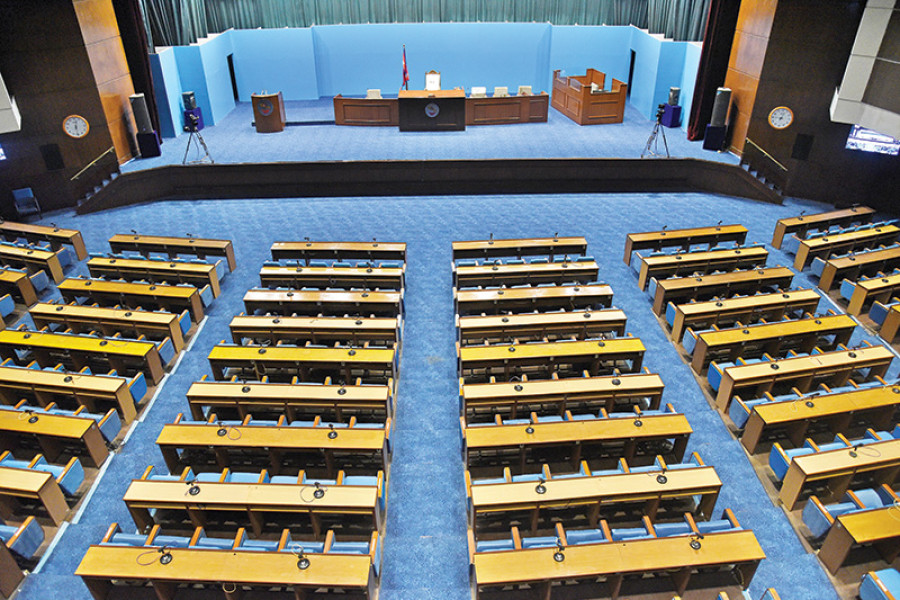National
House is reinstated, but neither government nor opposition has faith in it
The government hasn’t given Parliament any business, and the opposition too hasn’t used it to hold officials to account.
Binod Ghimire
The third meeting of the reinstated House of Representatives on Tuesday concluded after endorsing a motion to condole the demise of former minister and lawmaker Dinesh Chandra Yadav. Neither did the government present any bills before the House, not did the Speaker allocate time for special hours.
The meeting had concluded in a similar fashion a day earlier.
The KP Sharma Oli government is reluctant to provide any business to the House after its plan to table ordinances it issued in the past few months on March 7 was foiled due to obstruction from the opposition.
The ruling CPN-UML has accused Speaker Agni Sapkota of failing to play a constructive role in creating an environment to table the ordinances, despite constitutional and legal obligations to do so.
Oli on Tuesday accused Sapkota of assisting the opposition to breach the provisions of the constitution. “The Speaker, despite his responsibility to implement the constitution, colluded with the opposition to bar the government from presenting its ordinances,” Oli said during a tea reception he organised at Baluwatar on Tuesday.
“He (Speaker) stopped the law minister from presenting the ordinances and adjourned the House for a few minutes but never resumed it. He barred the government from fulfilling its constitutional obligation.”
Article 114 (2) of the Constitution of Nepal makes it mandatory for the government to present its ordinances before the House during its first meeting of the new session. Similarly, rule 93 (1) of the Regulation of the House of Representatives says the ordinances issued as per Article 114 of the Constitution of Nepal should be presented during the first meeting of the House session.
The Oli administration had issued eight ordinances, including one related to the controversial amendment to the Constitutional Council (Functions, Duties and Procedures) Act-2010, issued on December 15.
Oli might be blaming Sapkota for making the House ineffective, however, experts in parliamentary and political affairs say the three parties—the government, the opposition and the Speaker—have all played their roles in devaluing the importance of the House.
Daman Nath Dhungana, former speaker and a civil society leader, said while Sapkota’s inaction shows his inefficiency at running the House, the government and the opposition have a bigger role in undermining its importance.
“The Oli government will make every attempt to show that the House is of little use to claim that its dissolution was right. Denial to provide Parliament any business is a part of this plan,” he told the Post. “I haven’t also seen the opposition play any role to make Parliament effective. It’s move to prevent the government from presenting its tordinances, despite its constitutional obligation, has rather contributed towards devaluing the importance of the House.”
Experts say it was obvious that the government, which dissolved the House, has no liking towards it. That Oli has never attended a meeting of the reinstated House tells volumes about the government’s attitude towards the House. “The Lower House has turned out to be an unwanted baby for Oli,” Krishna Pokharel, a professor of Political Science at Tribhuvan University, told the Post. “It is the opposition and the Speaker who have the role to prove its essence. They, however, have failed to do so.”
Experts say even if the government doesn’t provide business to the House, the opposition can demand zero and special hour sessions. They say it is the right time for the opposition to make its presence felt as the government has turned defensive following the Supreme Court’s verdict to reinstate the House dissolved on December 20.
“It is said the House belongs to the opposition. However, even the opposition doesn’t seem to have faith in it,” Khim Lal Devkota, who writes columns on federalism for the Post, told the Post. “It doesn’t make sense to run the House if the government doesn’t give business to it and the opposition fails to make use of it.”
He said the role the Nepali Congress is playing shows that it doesn’t want to form a new government, but rather wants to create the situation where the House of Representatives gets dissolved constitutionally. Article 76 (7) of the Constitution of Nepal says the President, under the recommendation of the prime minister, can dissolve the House when there is a hung parliament and no party succeeds in forming a government.
Experts say political parties have failed to realise that Parliament is the only legitimate body through which public concerns can be raised. They say the people don’t elect their representatives just for them to engage in the game of making and pulling down the government. “It seems the parties have reduced the role of Parliament to making and unmaking the government. They have forgotten that it is the place to raise the voices of the people and hold the government to account,” said Dhungana, the former speaker. “This clearly shows that no party has faith in Parliament.”




 22.12°C Kathmandu
22.12°C Kathmandu














